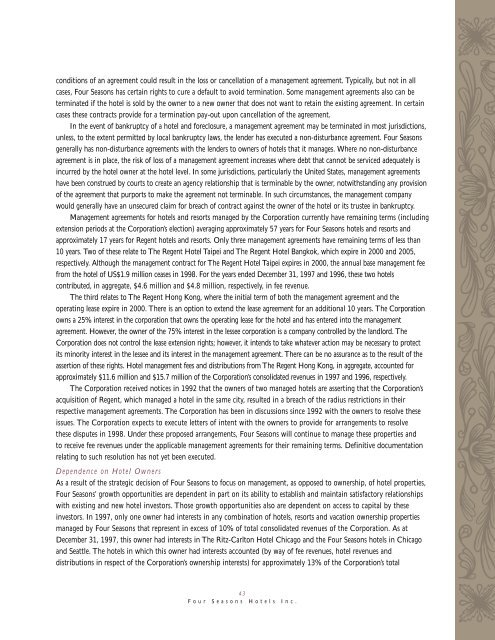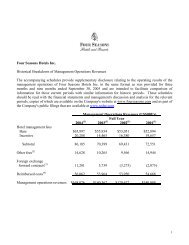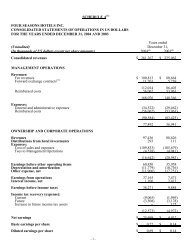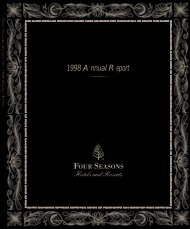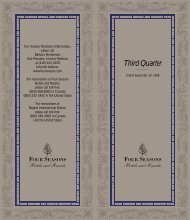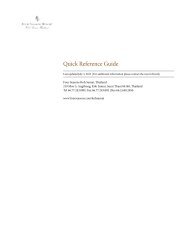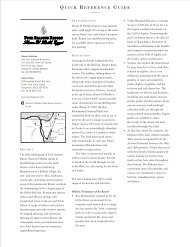1997 Annual Report - Four Seasons Hotels and Resorts
1997 Annual Report - Four Seasons Hotels and Resorts
1997 Annual Report - Four Seasons Hotels and Resorts
You also want an ePaper? Increase the reach of your titles
YUMPU automatically turns print PDFs into web optimized ePapers that Google loves.
conditions of an agreement could result in the loss or cancellation of a management agreement. Typically, but not in allcases, <strong>Four</strong> <strong>Seasons</strong> has certain rights to cure a default to avoid termination. Some management agreements also can beterminated if the hotel is sold by the owner to a new owner that does not want to retain the existing agreement. In certaincases these contracts provide for a termination pay-out upon cancellation of the agreement.In the event of bankruptcy of a hotel <strong>and</strong> foreclosure, a management agreement may be terminated in most jurisdictions,unless, to the extent permitted by local bankruptcy laws, the lender has executed a non-disturbance agreement. <strong>Four</strong> <strong>Seasons</strong>generally has non-disturbance agreements with the lenders to owners of hotels that it manages. Where no non-disturbanceagreement is in place, the risk of loss of a management agreement increases where debt that cannot be serviced adequately isincurred by the hotel owner at the hotel level. In some jurisdictions, particularly the United States, management agreementshave been construed by courts to create an agency relationship that is terminable by the owner, notwithst<strong>and</strong>ing any provisionof the agreement that purports to make the agreement not terminable. In such circumstances, the management companywould generally have an unsecured claim for breach of contract against the owner of the hotel or its trustee in bankruptcy.Management agreements for hotels <strong>and</strong> resorts managed by the Corporation currently have remaining terms (includingextension periods at the Corporation’s election) averaging approximately 57 years for <strong>Four</strong> <strong>Seasons</strong> hotels <strong>and</strong> resorts <strong>and</strong>approximately 17 years for Regent hotels <strong>and</strong> resorts. Only three management agreements have remaining terms of less than10 years. Two of these relate to The Regent Hotel Taipei <strong>and</strong> The Regent Hotel Bangkok, which expire in 2000 <strong>and</strong> 2005,respectively. Although the management contract for The Regent Hotel Taipei expires in 2000, the annual base management feefrom the hotel of US$1.9 million ceases in 1998. For the years ended December 31, <strong>1997</strong> <strong>and</strong> 1996, these two hotelscontributed, in aggregate, $4.6 million <strong>and</strong> $4.8 million, respectively, in fee revenue.The third relates to The Regent Hong Kong, where the initial term of both the management agreement <strong>and</strong> theoperating lease expire in 2000. There is an option to extend the lease agreement for an additional 10 years. The Corporationowns a 25% interest in the corporation that owns the operating lease for the hotel <strong>and</strong> has entered into the managementagreement. However, the owner of the 75% interest in the lessee corporation is a company controlled by the l<strong>and</strong>lord. TheCorporation does not control the lease extension rights; however, it intends to take whatever action may be necessary to protectits minority interest in the lessee <strong>and</strong> its interest in the management agreement. There can be no assurance as to the result of theassertion of these rights. Hotel management fees <strong>and</strong> distributions from The Regent Hong Kong, in aggregate, accounted forapproximately $11.6 million <strong>and</strong> $15.7 million of the Corporation’s consolidated revenues in <strong>1997</strong> <strong>and</strong> 1996, respectively.The Corporation received notices in 1992 that the owners of two managed hotels are asserting that the Corporation’sacquisition of Regent, which managed a hotel in the same city, resulted in a breach of the radius restrictions in theirrespective management agreements. The Corporation has been in discussions since 1992 with the owners to resolve theseissues. The Corporation expects to execute letters of intent with the owners to provide for arrangements to resolvethese disputes in 1998. Under these proposed arrangements, <strong>Four</strong> <strong>Seasons</strong> will continue to manage these properties <strong>and</strong>to receive fee revenues under the applicable management agreements for their remaining terms. Definitive documentationrelating to such resolution has not yet been executed.Dependence on Hotel OwnersAs a result of the strategic decision of <strong>Four</strong> <strong>Seasons</strong> to focus on management, as opposed to ownership, of hotel properties,<strong>Four</strong> <strong>Seasons</strong>’ growth opportunities are dependent in part on its ability to establish <strong>and</strong> maintain satisfactory relationshipswith existing <strong>and</strong> new hotel investors. Those growth opportunities also are dependent on access to capital by theseinvestors. In <strong>1997</strong>, only one owner had interests in any combination of hotels, resorts <strong>and</strong> vacation ownership propertiesmanaged by <strong>Four</strong> <strong>Seasons</strong> that represent in excess of 10% of total consolidated revenues of the Corporation. As atDecember 31, <strong>1997</strong>, this owner had interests in The Ritz-Carlton Hotel Chicago <strong>and</strong> the <strong>Four</strong> <strong>Seasons</strong> hotels in Chicago<strong>and</strong> Seattle. The hotels in which this owner had interests accounted (by way of fee revenues, hotel revenues <strong>and</strong>distributions in respect of the Corporation’s ownership interests) for approximately 13% of the Corporation’s total43<strong>Four</strong> <strong>Seasons</strong> <strong>Hotels</strong> Inc.


